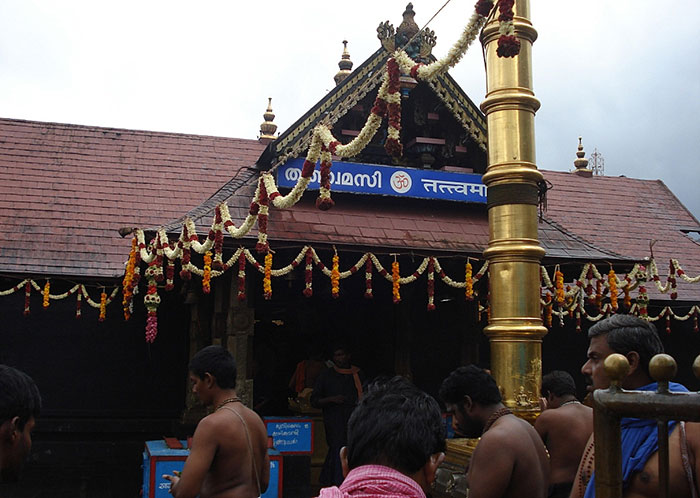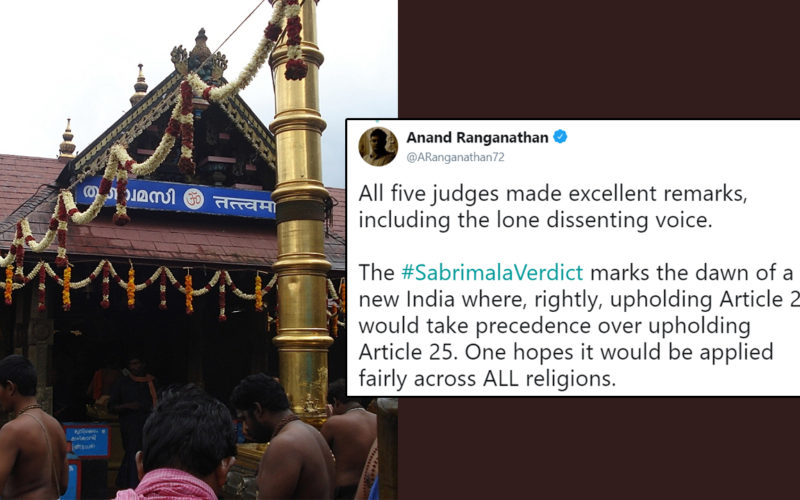- 4.4Kshares
- Share
- Tweet
- Facebook Messenger
I’ve always been very proud of choosing to follow my passion and being a writer. Many people wondered why I had chosen to give up a career in law to become a writer. But since I loved it so much, I didn’t care! But lately, watching the Supreme Court of India deliver one stellar judgement after another, I’ve been secretly wishing I was part of the lawyer community and could feel proud of my profession!
In another judgement worthy of breaking news and Twitter trends, a five-judge bench of the Supreme Court has struck down the ban that prevented women of menstrutating ages to enter the Sabarimala Temple in Kerala.
[Breaking] Swamini Saranam: Supreme Court allows entry of women into #Sabarimala temple #SabarimalaVerdict https://t.co/S53oE16NxP
— Bar & Bench (@barandbench) September 28, 2018
“Social exclusion of women on mensuration is untouchability and is anathema to the Constitution.”
The Hindu temple, dedicated to Lord Ayyappa, had prohibited entry to women devotees in the age group of 10-50. To impose this prohibition, the Travancore Devasom Board (administration of Sabarimala) took recourse to Article 26 of the Indian Constitution, which allows a religious denomination to manage its own religious affairs.

Another provision that supported this ban was Rule 3(b) of Kerala Hindu Places of Public Worship (Authorisation of Entry) Rule, 1965, which states that women may be excluded from public places of worship if this exclusion is based on custom.
The #SabarimalaVerdict was pronounced with a 4:1 majority.
While CJI Dipak Misra, Justice AM Khanwilkar, Justice Chandrachud and Justice Nariman were in concurrence of striking down the ban, the only female judge on the bench, Justice Indu Malhotra was the lone dissent.
Pronouncement concludes. SC strikes down the rule prohibiting entry of women between the age of 10-50 years by 4:1 majority.
CJI Dipak Misra, Justices AM Khanwilkar, Nariman, Chandrachud – Majority
Justice Indu Malhotra – Dissenting
#Sabarimala #SabarimalaVerdict pic.twitter.com/36P5GUfXIT— Bar & Bench (@barandbench) September 28, 2018
Some very astute points were made out by the CJI and the judges in favour of lifting the ban, chief amongst them being that it was violative of fundamental rights guaranteed by the Constitution.
“The practice of age restriction on women’s entry to Sabarimala Temple can’t be treated as an essential religious practice.”
CJI Misra wrote in his judgement that the devotees of Ayyappa did not constitute a religious denomination, and therefore could not take recourse to Article 26 in this case.
#Sabarimala: Devotees of Ayyappa do not constitute a separate relgious denomination, CJI Dipak Misra. pic.twitter.com/QJMPchN7qs
— Bar & Bench (@barandbench) September 28, 2018
As for the other Rule 3(b), it was deemed to be violative of Article 25 of the Constitution in case of Hindu women.
Rule 3(b) of 1965 Rules is a clear violation of right of Hindu women to practice religion under Article 25, CJI Dipak Misra. pic.twitter.com/4nh89r5bIS
— Bar & Bench (@barandbench) September 28, 2018
The rule was struck down by Justice Nariman.
The custom of barring women is violative of Article 25(1). Rule 3(b) of Kerala Hindu Places of Public Worship (Authorisation of Entry) Rules,1965 struck down by Justice Nariman.
Justice Rohinton Nariman concurs with CJI Dipak Misra.
— Bar & Bench (@barandbench) September 28, 2018
Yet again, Justice Chandrachud managed to make an impressive point that had social media applauding.
Birthmarks and physiology are not the basis to deny constitutional entitlements.
To treat women as children of a lesser god is to blink at the constitution itself. Justice Chandrachud— Live Law (@LiveLawIndia) September 28, 2018
Justice Indu Malhotra, the lone dissent on the verdict, also had some sharp and logical points to make for why the Supreme Court should not be interfering with religious customs.
Issues of deep religious sentiments should not be ordinarily be interfered by the Court: Justice Indu malhotra in her dissenting opinion
— Live Law (@LiveLawIndia) September 28, 2018
Court should not interfere unless if there is any aggrieved person from that section or religion: Indu Malhotra #Sabarimala
— Live Law (@LiveLawIndia) September 28, 2018
Just as there was a marginal dissent in the Sabarimala verdict, so was on in Twitter’s reaction to it.
While the verdict was well-received by some, who called it another addition to Supreme Court’s impressive streak of judgements to usher in a new India, there were those who believe the judgement opens up a Pandora’s box of issues for other religions.
Barkha Dutt’s got a crush on the SC!
My minor crush on the Supreme Court could become major at this rate 🙂 Thank you . Menstruating Women can no longer be barred from #Sabarimala – Bleeding is not a blot. #StopSexism #Period. #SabarimalaVerdict p.s curious dissent by lone female judge on bench https://t.co/GAj2jA6e0T
— barkha dutt (@BDUTT) September 28, 2018
Can Supreme Court please rule?
Neither Cong; nor BJP;
ab ki baar, the party of BAR (council) 🙏
If the SC judges decide to float a party for 2019, I am sure ,they will win hands down#AyodhyaVerdict #Sabarimala #497 #377— Mandar Kulkarni (@mandarisunique) September 28, 2018
Striking down pillars of patriarchy like!
What month for empowerment. Triple Talk gone, Adultery not a crime, LGBTQ can live in please and now #Sabarimala. Pillars of patriarchy is going down. #SabarimalaVerdict
— Honey George (@honeygeorge74) September 28, 2018
A new India!
Honourable Supreme Court is playing a huge role in the making of a new changed India #Sabarimala
— Ruchi (@tweetruchhii) September 28, 2018
Many people were surprised why the lone female judge on the bench would be in dissent over lifting a ban on women from entering the temple.
Judges cannot intervene and decide on whether a practice is violative of fundamental rights or not. Personal views of judges do not matter. A religious denomination has freedom to believe and even practice even if their beliefs are illogical or irrational: Justice Indu Malhotra
— Vicky Nanjappa (@vickynanjappa) September 28, 2018
However, there were those who pointed out that Justice Indu Malhotra’s logical argument was indeed commendable.
All five judges made excellent remarks, including the lone dissenting voice.
The #SabrimalaVerdict marks the dawn of a new India where, rightly, upholding Article 21 would take precedence over upholding Article 25. One hopes it would be applied fairly across ALL religions.
— Anand Ranganathan (@ARanganathan72) September 28, 2018
Justice Indu Malhotra’s dissent is based on her argument that the devotees of Ayyappa are religious denominations. Therefore, an SC verdict that interferes with their customs might have serious implications on other religious denominations too.
While it may seem disappointing, I hope Twitter doesn't go mad about Indu Malhotra's dissent. Her arguments also well thought out, especially wondering about the point of the impact on other religious denominations based on this judgement. #Sabarimala
— Kajal K Iyer (@Kajal_Iyer) September 28, 2018
She gave a fair warning alright!
May disagree with Indu Malhotra's judgement but do agree with much of what she says. She warns "here be dragons". But progress demands we venture deep into the unknown.
— ❓knowsnotmuch (@knowsnotmuch) September 28, 2018
A true sense of secularism in the voice of dissent.
Respect for Justice Indu Malhotra. Her dissent displays true sense of secularism and our constitutional values. I hope our media will hail her dissent even half of how they hailed Justice Chandrachur for his dissent in Aadhaar judgement.
— Rahul Kaushik (@kaushkrahul) September 28, 2018
Despite the lifting of the ban, there are many women who will still wish to wait to enter the temple, and some of them have even tweeted that they choose to carry on that custom.
At one level, a gender inequality has been rectified 👌
However, many devotees are too ingrained in this women cannot go to #sabarimala, if they do they'd be divine wrath. I hope this is countered too, ppl take that risk, overcome that fear, & own this judgement! https://t.co/88YRut8Q3V
— pins (@chukkukkapi) September 28, 2018
One can only hope that whatever they wish to do, they’ve got the freedom to practice it.
- 4.4Kshares
- Share
- Tweet
- Facebook Messenger




